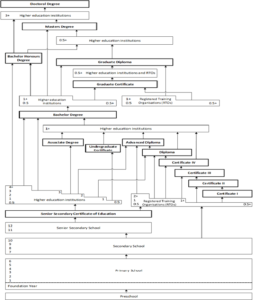Australia

Australian Government Department of Education
GPO Box 9880
Canberra ACT 2601
Australia
E-mail Address: [email protected], [email protected]
Website: https://www.education.gov.au/international-education/recognise-overseas-qualifications
Head of Centre: Joanna Wilson, Director, Qualifications Recognition
Education
Overview of the Australian education system
The Commonwealth of Australia comprises eight states and territories:
- New South Wales
- Queensland
- South Australia
- Tasmania
- Victoria
- Western Australia
- Australian Capital Territory, and
- Northern Territory
There are three levels of Australian government:
- Australian (federal)
- state and territory, and
- local
Australian and state and territory governments are responsible for education and training.
School education
School education is for 13 years. Students commence school at around five years of age. The stages of school education are:
- primary school (Foundation Year to Year 6)
- secondary school (Years 7 to 10), and
- senior secondary school (Years 11 and 12)
Primary and secondary education are usually delivered through separate schools, although some schools offer Foundation Year to Year 12 education. Many secondary schools also include senior secondary school.
Postsecondary education
Postsecondary education is known as tertiary education. Tertiary education includes higher education and vocational education and training.
For more information, see Higher education (page 14),Vocational education and training (page 30), School education (page 50) of the Australia Country Education Profile (CEP).
A diagram of the Australian education system is below:
Australian Government Department of Education
The Department of Education contributes to Australia’s economic prosperity and social wellbeing by creating opportunities and driving better outcomes through access to quality education and learning.
Link(s): English
Tertiary Education Quality and Standards Agency (TEQSA)
TEQSA is Australia’s independent national quality assurance and regulatory agency for higher education, established under Australian law. Their purpose is to protect student interests and the reputation of Australia’s higher education sector through a proportionate, risk-reflective approach to quality assurance that supports diversity, innovation and excellence.
Link(s): English
Australian Skills Quality Authority (ASQA)
ASQA is the national regulator for Australia’s vocational education and training sector (VET). Their purpose is to ensure quality education and training so that students, employers, governments and the community can have confidence in the integrity of qualifications issued by vocational education and training providers.
Link(s): English
The Australian Qualifications Framework (AQF)
The AQF is the national policy guide for regulated qualifications in the Australian education and training system. The AQF defines the essential characteristics, including the required learning outcomes, of the different types of qualifications issued across the senior secondary education, vocational education and training (VET) and higher education systems in Australia.
Link(s): English
National Information Centre (NIC) Information and Activities
Australia’s National Information Centre under the UNESCO qualifications recognition conventions, including the Tokyo Convention, is the Australian Government Department of Education.
The department has a policy advising and information provision role in the recognition of overseas qualifications. It also provides a suite of information products and services to support organisations to make quality decisions in the assessment of overseas qualifications.
This includes support to Australian state and territory governments that provide assessment advice on the comparability of an individual’s overseas qualification for general employment purposes within their respective jurisdictions. In limited circumstances, the department assesses overseas qualifications to support individuals seeking general employment. It also responds to enquiries for individuals seeking information on how to obtain recognition of their overseas qualification(s) in Australia.
More information can be found at www.internationaleducation.gov.au
Contact details
Head of Centre: Jane Azurin, Director, Qualifications Recognition Policy Section Australian Government Department of Education
Email Address: [email protected]
Higher Education Institutions (HEI) Landscape and Mobility
Higher education
Quality assurance in higher education is based on a strong partnership between the Australian Government, state and territory governments and the higher education sector.
Tertiary Education Quality and Standards Agency
The Tertiary Education Quality and Standards Agency (TEQSA) is the national regulator and quality assurance agency for the Australian higher education system, established under Australian law through the Tertiary Education Quality and Standards Agency Act 2011 (TEQSA Act). TEQSA also assures the quality of higher education (and some English language and foundation program) services to international students in Australia under the Education Services for Overseas Students Act 2000.
TEQSA provides national consistency in the regulation of higher education and maintains Australia’s reputation for high-quality education, across all registered institutions and modes of delivery. All higher education institutions that offer Australian Qualifications Framework (AQF) qualifications must meet quality standards through TEQSA’s registration and re-registration processes, as well as course accreditation and reaccreditation for education institutions without self-accrediting authority. TEQSA’s approach is underpinned by the three principles of regulatory necessity, reflecting risk, and proportionate regulation. This means that TEQSA’s approach to regulating higher education institutions differentiates between institutions based on their track record of compliance with the Higher Education Standards Framework.
Higher Education Standards Framework
The Higher Education Standards Framework is the benchmark against which TEQSA registers and evaluates higher education institutions. The Framework covers quality assurance matters such as teaching and learning, research, governance and administration.
A higher education institution must comply with the Framework to be registered with TEQSA as a higher education institution in Australia. TEQSA has the authority to enforce standards under the TEQSA Act.
For more information on TEQSA, see www.teqsa.gov.au.
Vocational education and training (VET)
The key elements of accreditation and quality assurance of the VET system are:
- national and state VET regulators
- quality delivery through the VET Quality Framework (VETQF) and the Australian Quality Training Framework (AQTF)
- quality training products through training packages and accredited courses
- a national register of VET institutions, qualifications and courses
The VETQF and AQTF provide national consistency for institution registration, monitoring and enforcement of quality standards.
National and state VET regulators
The Australian Skills Quality Authority (ASQA) is the national VET regulator authority, established under Australian law through the National Vocational Education and Training Regulator Act 2011. ASQA is responsible for regulating Registered Training Organisations (RTOs) in the Australian Capital Territory, New South Wales, Northern Territory, South Australia, Queensland and Tasmania.
Victoria and Western Australia have not referred their regulatory powers to ASQA, although, any RTO in these states that also operates in other states or territories, or enrols international students, is under the jurisdiction of ASQA. In Victoria and Western Australia, the state regulatory authorities continue in their roles.
ASQA quality assures the VET sector by implementing the Standards for RTOs, the Standards for VET Accredited Courses and the Education Services for Overseas Students Act 2000.
Prior to ASQA’s establishment, there was a VET regulatory authority in each state and territory that quality assured RTOs and accredited courses in their jurisdiction. Decisions made by these bodies in referring states and territories remain valid until they expire, or ASQA re-registers or re-accredits the RTO or course.
VET Quality Framework
VETQF was introduced under the National Vocational Education and Training Regulator Act 2011. Mirroring the AQTF (see below), the VETQF provides the basis for a nationally consistent, high quality VET sector. The VETQF includes standards for registration, monitoring and quality assurance of the VET sector and standards for accreditation. These include the:
- Standards for RTOs
- Fit and Proper Person Requirements
- Financial Viability Risk Assessment Requirements
- Data Provision Requirements
- Australian Qualifications Framework (AQF)
The VETQF is supported by the Standards for VET Accredited Courses, which identify course design quality standards that must be adhered to.
Australian Quality Training Framework (AQTF)
States that have not referred their registration and regulation powers to ASQA (i.e. Victoria and Western Australia) are required to meet the requirements of the AQTF.
The Australian Quality Training Framework (AQTF) is the national set of compliance Standards and Essential Conditions that the VET training provider must meet to become a Registered Training Provider (RTO).
The AQTF was developed collaboratively with the Australian Government, state and territory governments, industry and training organisations, to support a nationally consistent, high-quality VET sector. It comprises standards for registration, auditing, quality assurance and accreditation, including standards for:
- RTOs
- state and territory registering bodies
- state and territory accrediting bodies
- accredited courses
For more information about national and state VET regulators and quality assurance of the VET system, see www.asqa.gov.au (national), www.vrqa.vic.gov.au (Victoria) and www.tac.wa.gov.au (Western Australia).
National Register Higher Education Providers
The National Register of Higher Education Providers is the authoritative primary source of information on the status of registered higher education providers in Australia. The National Register can be used to search by provider or courses. The National Register is maintained by the Tertiary Education Quality and Standards Agency (TEQSA).
Link(s): English

